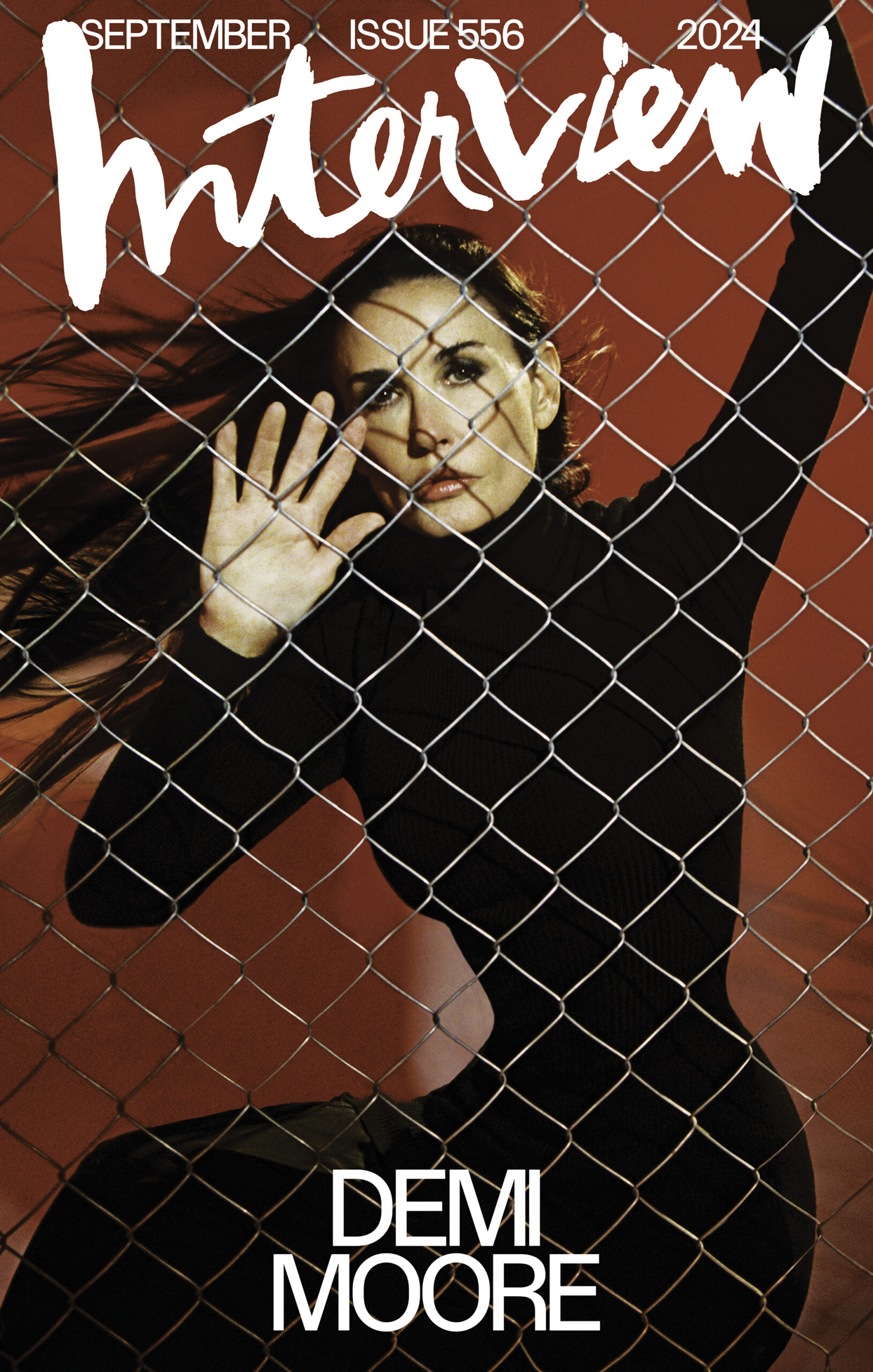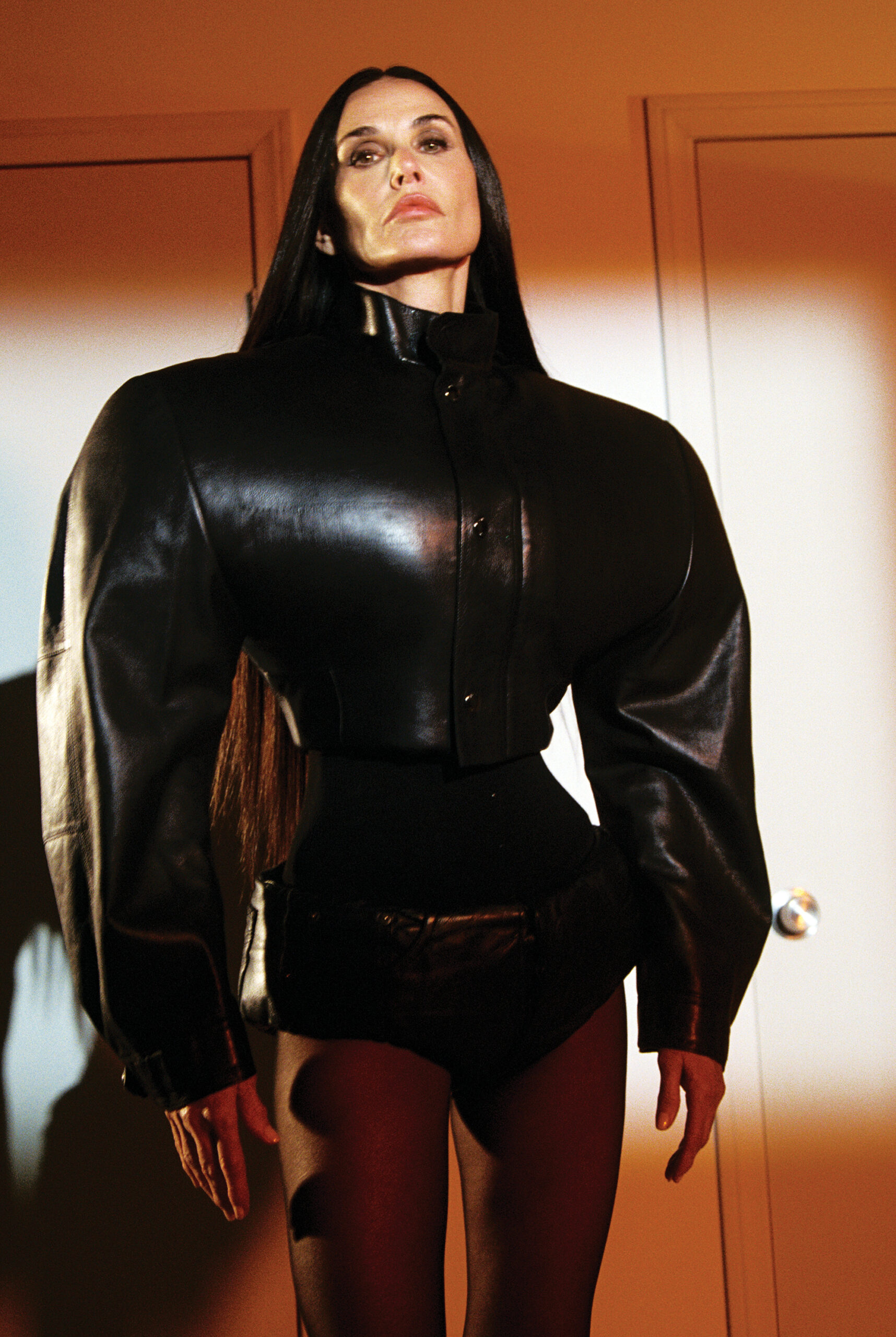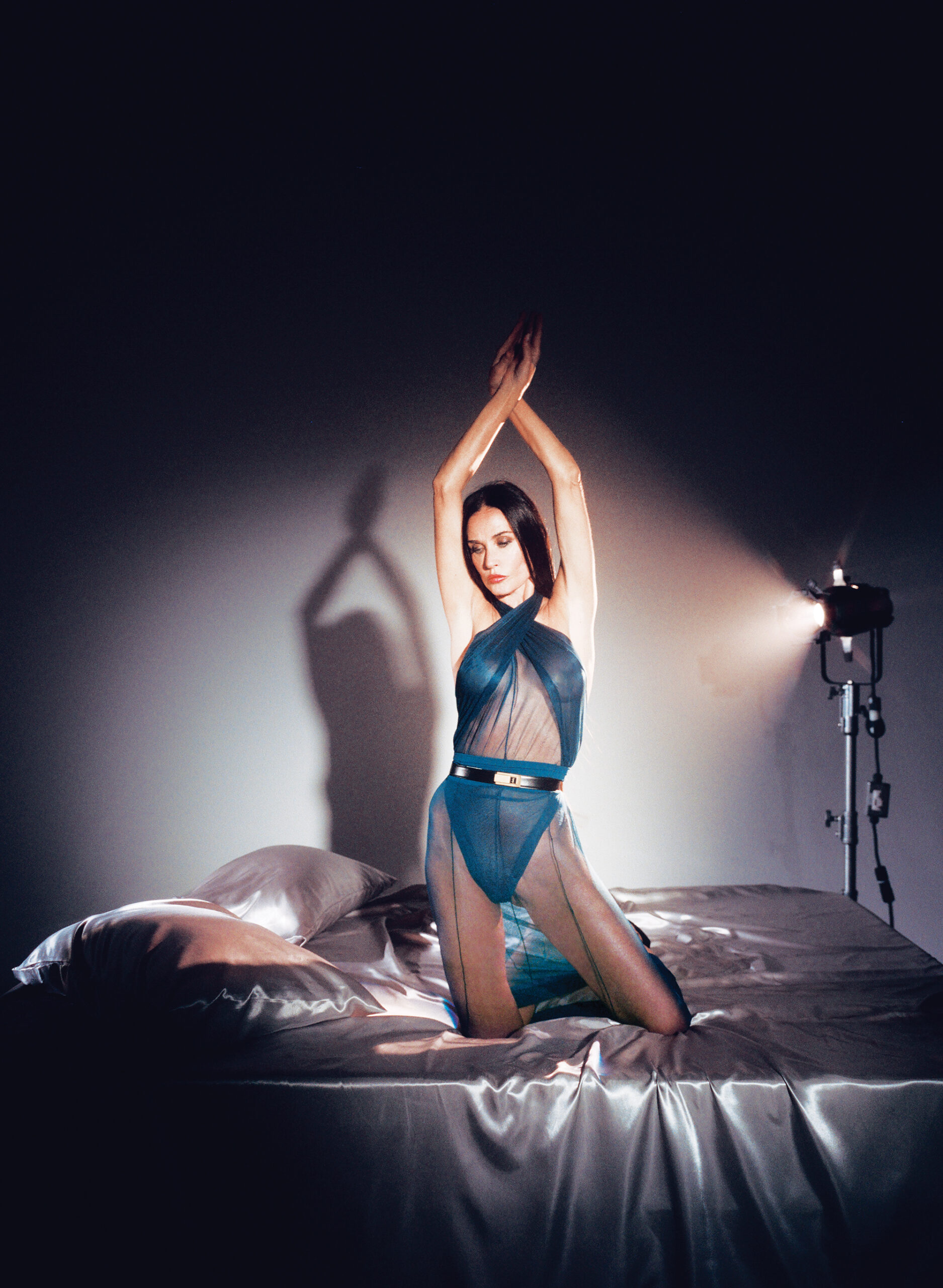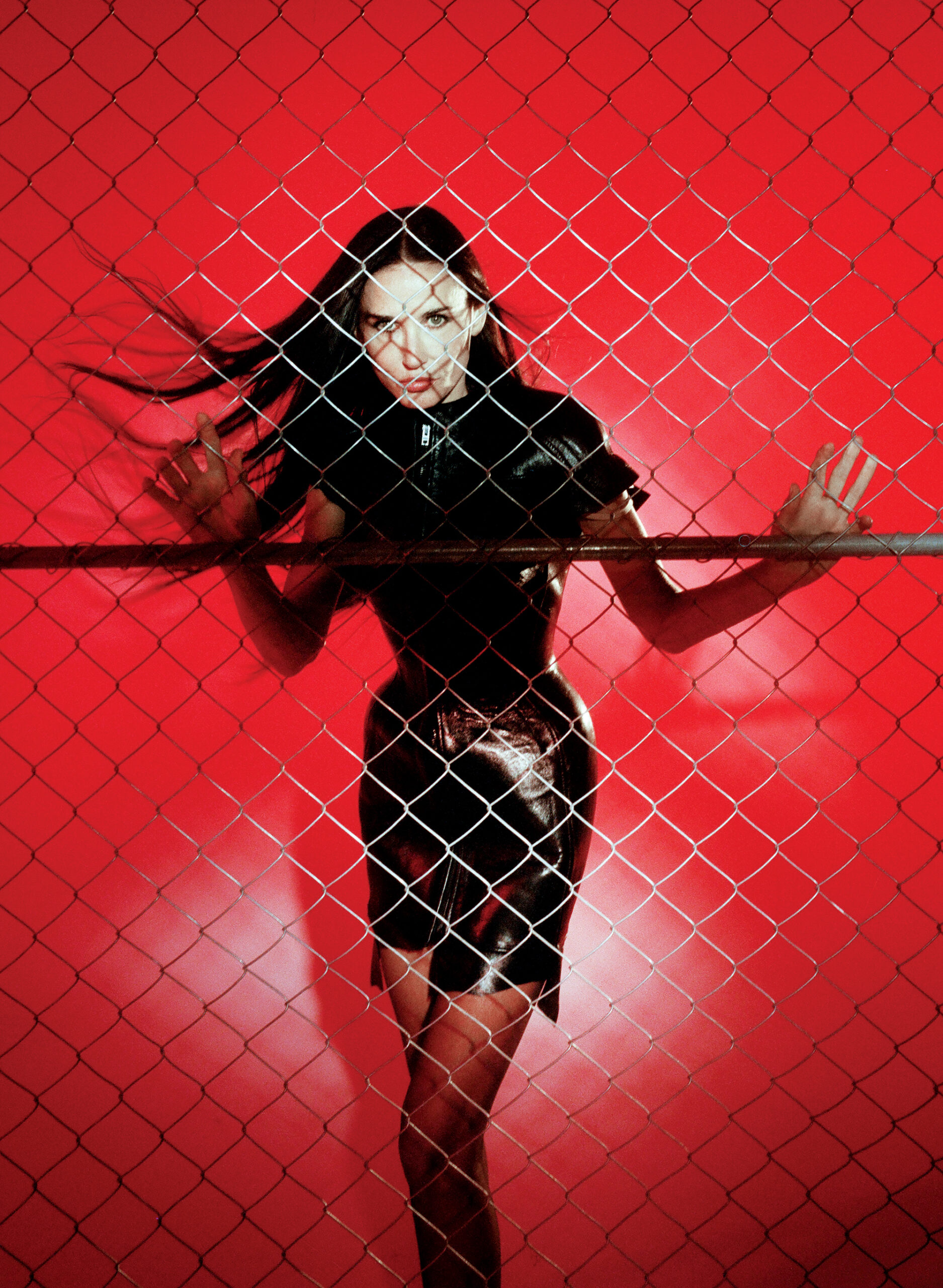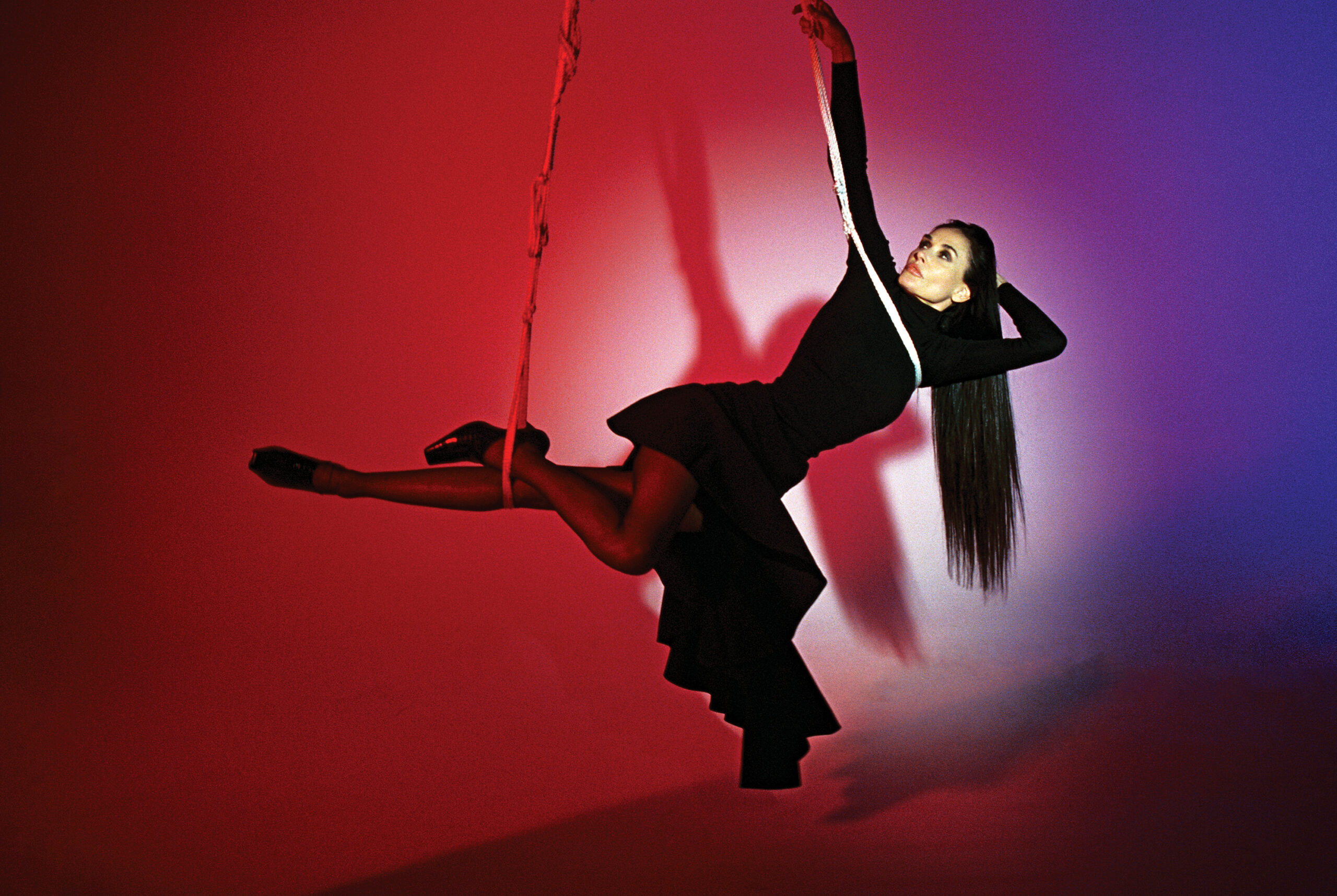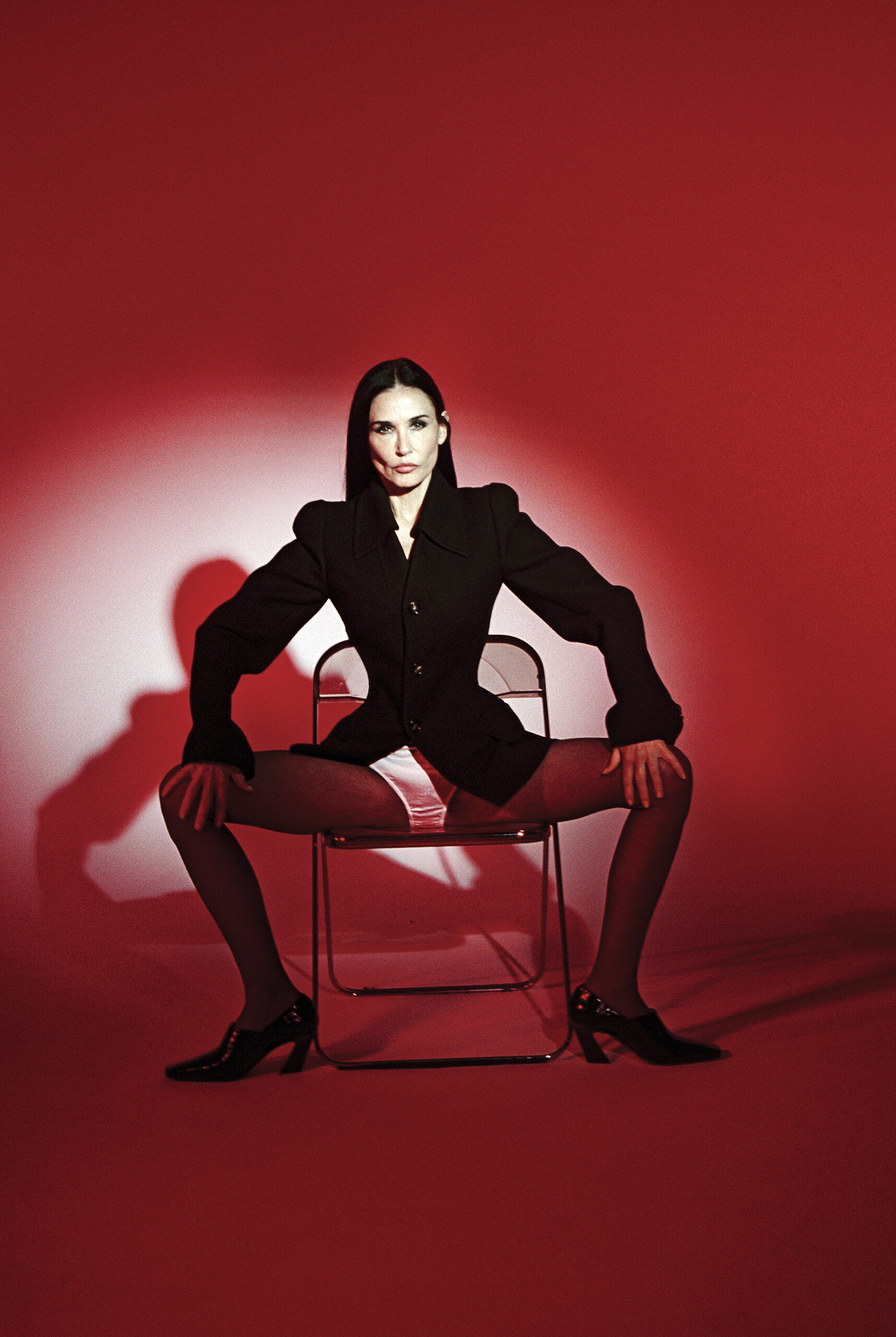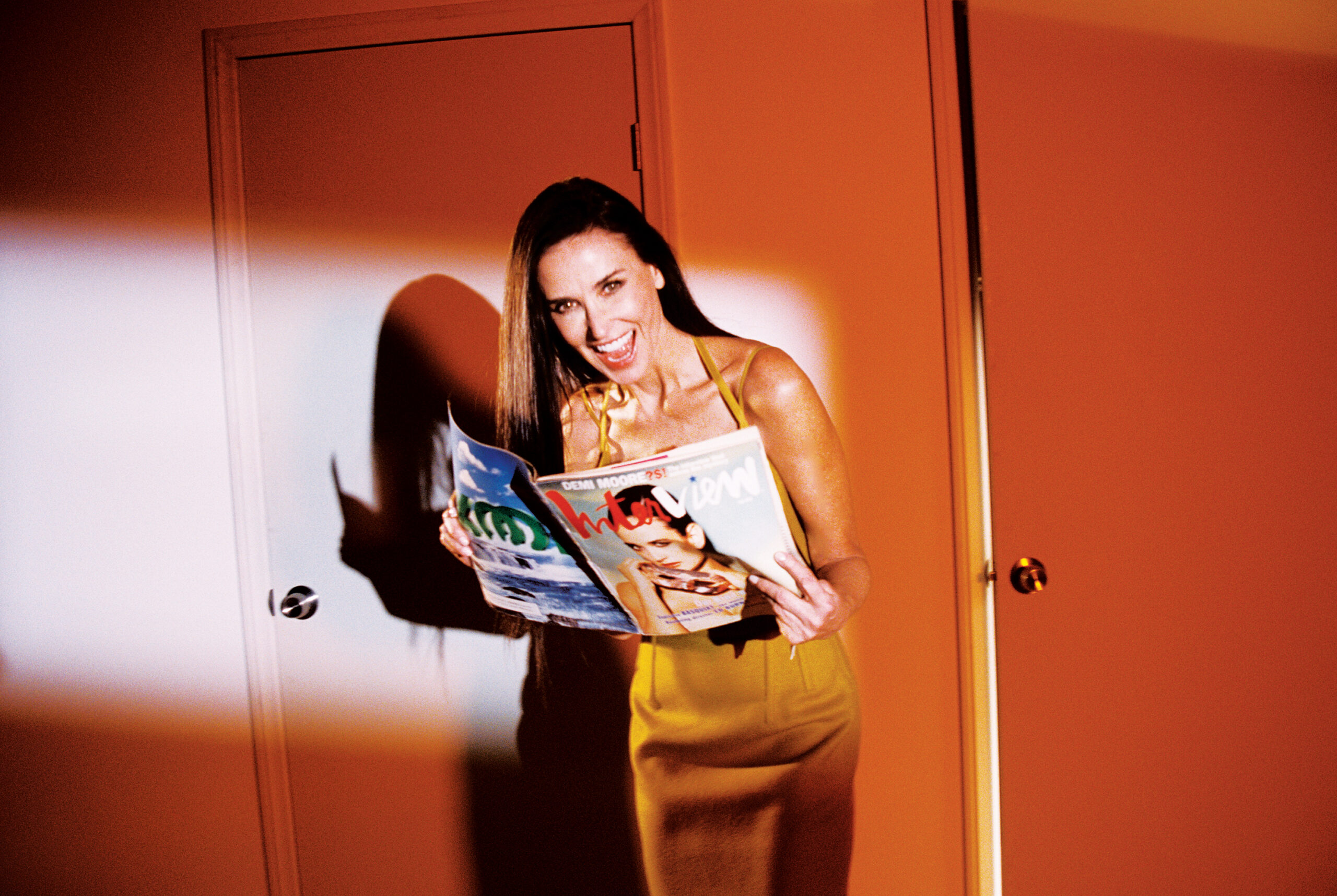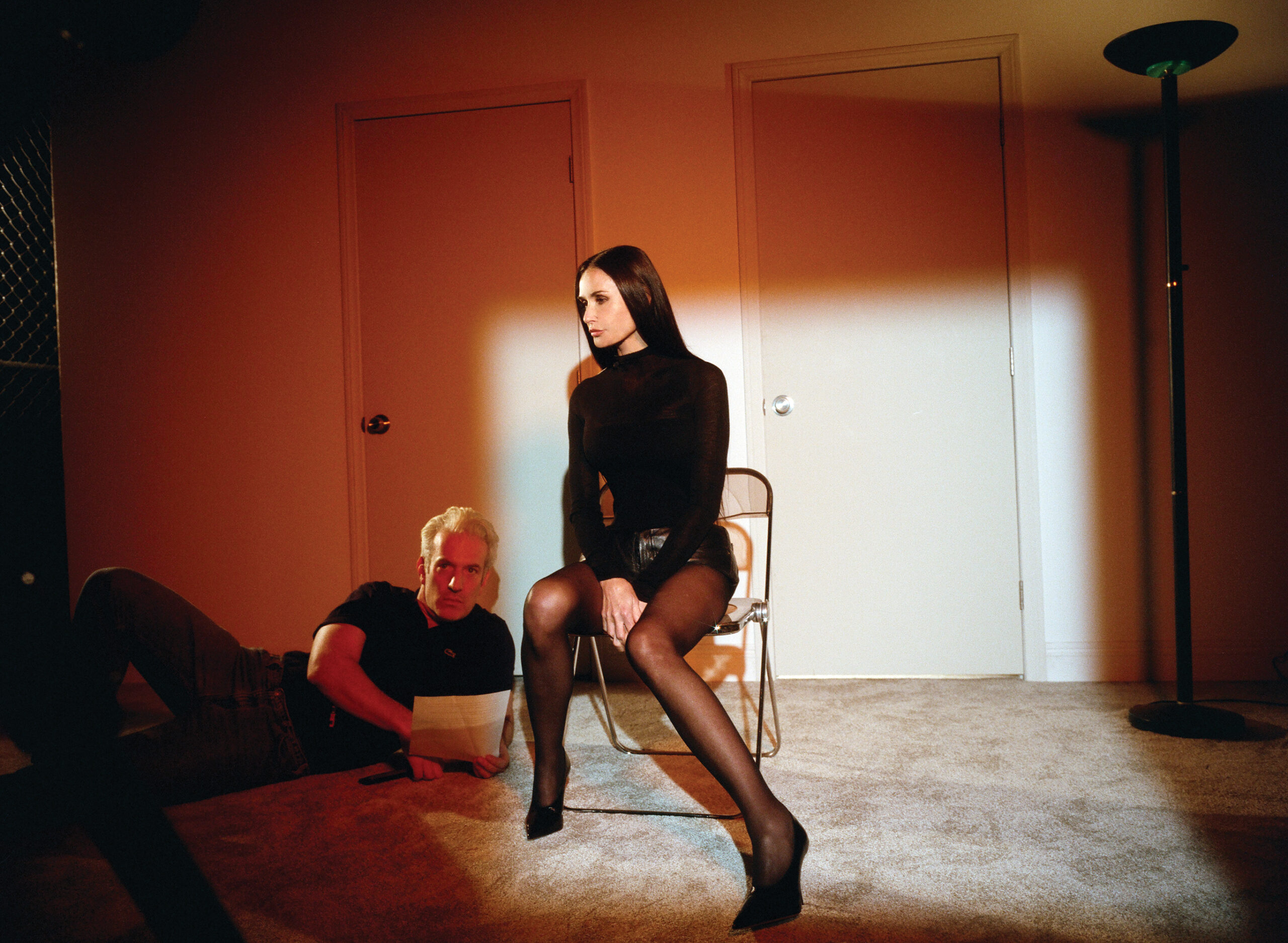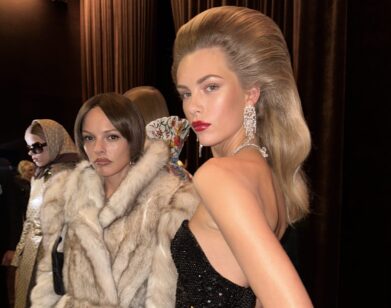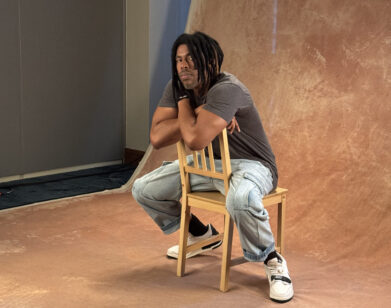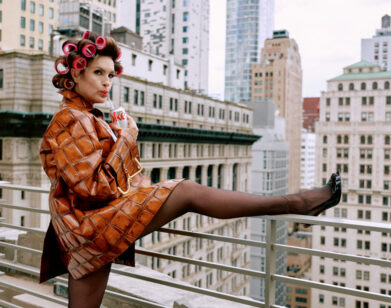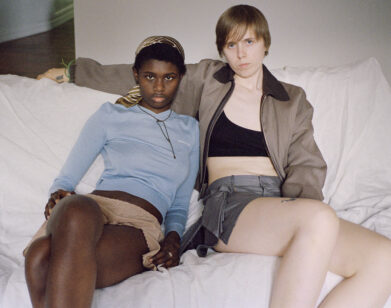COVER
Demi Moore’s Gory Glory
“Grotesque.” “Divisive.” “Exhilarating.” “Bonkers.” “Freakish.” “Batshit.” “Crazy.” When The Substance premiered at Cannes last spring, it sent shockwaves down the Croisette and immediately made Demi Moore the center of attention—again. Throughout her career, the 61-year-old superstar has been a natural-born headline getter, and her starring role in director Coralie Fargeat’s body-horror fantasy signals that she’s not done yet. In it, she plays Elisabeth Sparkle, a fading Hollywood beauty who turns back time with a black-market drug that carries some extremely gnarly side effects. Youth, vanity, desire, relevance—they’re ideas that Demi Moore knows all too well and, as she tells her fellow actor Michelle Yeoh, was dying to tackle.
———
TUESDAY 7 AM JULY 16, 2024 L.A.
DEMI MOORE: Hello! I hear you, but I don’t see you.
MICHELLE YEOH: Well, the good news is I see you. Oh my god, your movie is—I think I’m still in shock. I am a huge horror buff, but I didn’t know that The Substance was horror to that extent. It was mind-blowing. How did you do it?
MOORE: Oh my gosh. What can I say? First of all, thank you so much. This is so exciting for me, and I can’t believe you’re a horror buff. I feel like I’m waking up to this whole genre.
YEOH: Oh my god!
MOORE: And this film, just when you think it can’t go any further or get any weirder, it does, and then it does again. I’m so glad you loved it.
YEOH: Oh, I did. The thing I do love—you’re not just dealing with the #MeToo movement or objectification, you’re dealing with self-love or self-loathing and the inability to accept who you are. So you’re always trying to change to be someone else. But a lot of your scenes were mainly on your own, right? That whole scene where you were dressed to go out and you came back in—how many women go through that? “I cannot be seen like I’m being too sexy.” Please tell me your process!
MOORE: What you described is what moved me when I read the script, because it was such a unique way to be exploring this issue of aging, of societal conditioning, of what I also see as the pressure of the male-idealized woman that we as women have bought into. At the core of it, what it’s really about is what we do to ourselves, and I loved that it was illustrated in such a physical way—showing that violence with what we do with our thoughts, how we attack ourselves and distort things. There’s great power in knowing that what we do to ourselves is a choice, and we can make a different choice. And for those who aren’t looking for such a deep message, it’s just entertaining.
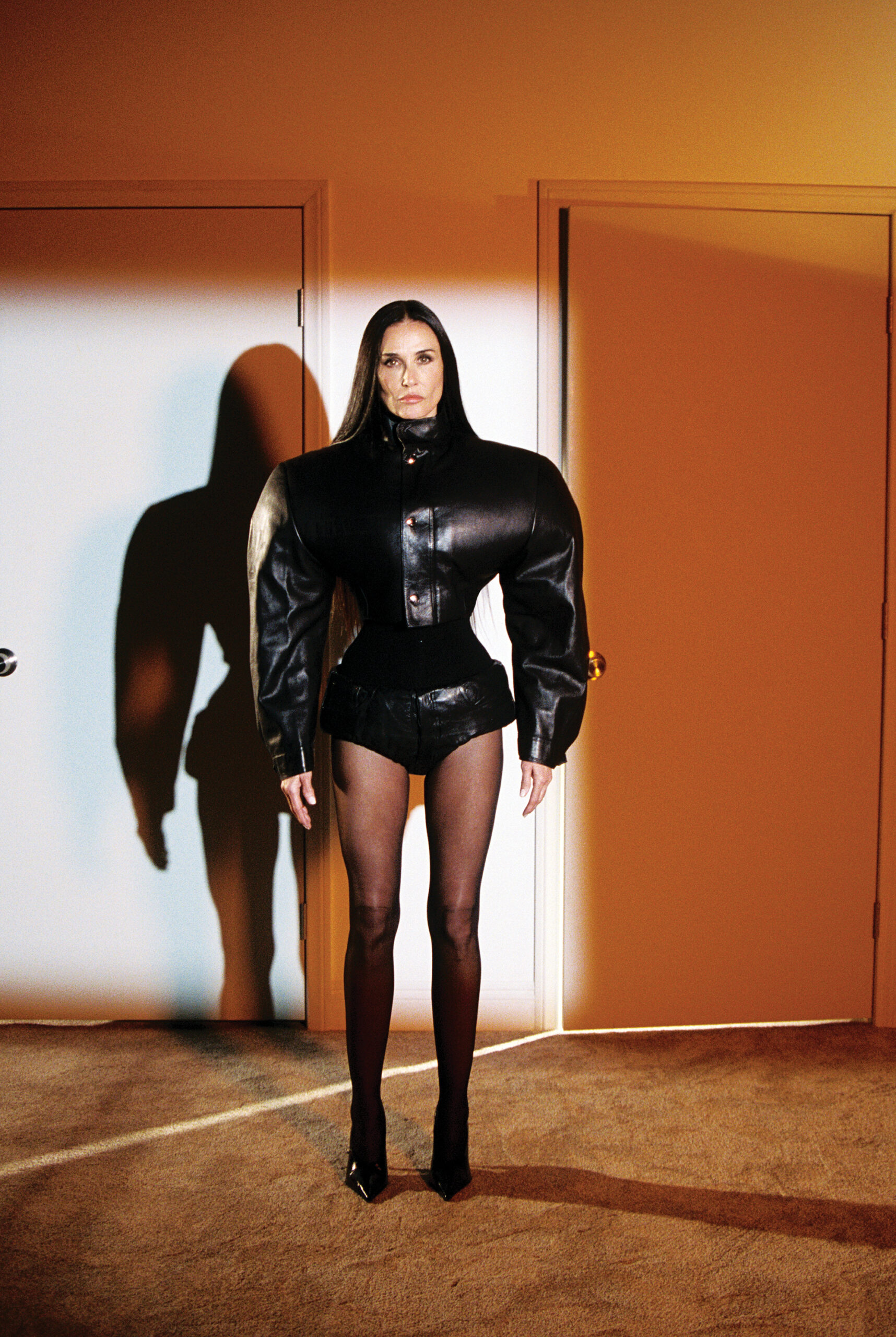
Jacket and Shorts Duran Lantink. Sweater Versace. Tights (worn throughout) Wolford. Shoes Paris Texas.
YEOH: The message is so evident and that is the beauty of it. Even though, yes, you have a lot of gore. I mean, I almost fell off my chair a couple times when I was watching it. I literally fell backwards, and I’m like, “How the hell did that happen?” But Demi, you as Elisabeth Sparkle, she’s only 50, and it’s not something that happens overnight. It’s a whole process from when you start your career, when you’re young. And yes, it’s a natural progression that all of us have to accept, and I think the beauty of this movie is about self-acceptance.
MOORE: You got it.
YEOH: But that journey into it, we faced it because we’re both—I’m a little older than you, so I’m the elder here.
MOORE: [Laughs] Not by much, Michelle, not by much.
YEOH: [Laughs] We’ve both faced it along the way, but what I really admire about you is that you’ve always put family first. It wasn’t so much, “Oh, I’m older, so I have less choices.” It’s about you making certain choices. So for you to do a movie that is so much about what we face—and you go through such a scary process, because for example, when I saw the nudity of you two gorgeous actresses, you don’t feel like, oh god, Coralie [Fargeat, the director] is trying to exploit their bodies. Because it’s out there, for the world to see you in your full glory, right?
MOORE: Yes, right.
YEOH: So there must have been such a connection with you and the director. I’m sure when you read the script, it was there.
MOORE: It was, and she spent a lot of time, way before we were on set, being very clear on the importance of the vulnerability of being in that nude state. It was not about it being sexualized, but it was about being raw and exposed in those ways that we are when we’re alone and we’re not thinking that anybody’s looking. It was something that needed to be without decoration. I mean there was truly a part, when Margaret [Qualley] and I were on this cold tile floor having to be draped on one another—and it was a very serious scene—that we both just burst out laughing, saying, “Thank god we like each other, because otherwise this would be really awkward.” I felt like I had such a partner in this with Margaret, that we both were exploring this from two different aspects. Sometimes it felt like I represented Coralie in her present time, and Margaret was representing this perfected idea that was, in Coralie’s experience, held against her. And I don’t even think it’s limited to women. At the core of this, it’s so much a reflection of our human condition, because for me, it’s not against men.
YEOH: No, it’s not. I think Dennis [Quaid] did a caricature of those sexist jerks out there.
MOORE: Yes.
YEOH: And there are many of them, but you’re right, I don’t think we do this to say that we hate men. I’m sure some men feel that they have to look a certain way to be able to partake in certain roles, so they do the same things to themselves. And it’s not limited to being in our industry. That kind of violence and what we do to our bodies and our faces is across the board.
MOORE: I think the thing, and you represented this so beautifully when you accepted your [Academy] award, is the idea of remembering that we can define where we want it to go and who we are. We don’t have to fight against that, we just have to believe that something else is possible. To me, what’s exciting is, in the film, I’m representing a past ideal and not what my present is.
YEOH: Wow! Is that why this resonated when you read the script?
MOORE: Oh, definitely. What’s interesting is I felt it more when I hit my forties. I had done Charlie’s Angels, and there was a lot of conversation around this scene in a bikini, and it was all very heightened, a lot of talk about how I looked. And then I found that there didn’t seem to be a place for me. I didn’t feel like I didn’t belong. It’s more like I felt that feeling of, I’m not 20, I’m not 30, but I wasn’t yet what they perceived as a mother.
YEOH: Where do you fit in?
MOORE: Yeah, where do I fit in? It was a time that felt, not dead, but flat.
YEOH: Hollywood is cruel to women of that age, where you don’t find the scripts or the characters that resonate with you anymore. It’s either, you are the mother or you’re old enough not to be sexy in their eyes. It’s like, why can’t a 45-year-old, a 50-year-old, or 60-year-old, be sexy? But that whole perception is undergoing a lot of change because people like you and me won’t sit back and just take it.
MOORE: No. And I don’t know if I’ve ever done that when I’ve come up against something that I don’t understand exists as a limitation.
YEOH: Right! You’ve always been a trailblazer. You’ve pushed the envelope, and that’s what we have to continue to do. So are you getting back more into making movies?
MOORE: I am. I’m still waiting for us to find something to do together.
YEOH: Oh my god, that would be—
MOORE: That would be my dream.
YEOH: I don’t think I have the courage to do what you just did in this movie.
MOORE: Well, I think that you have plenty to teach me, and perhaps I might have something I could share.
YEOH: Oh, there’s so much I can learn from you. But tell me about the whole prosthetics part, and why your character just couldn’t stop?
MOORE: That at its core is the addiction. For Elisabeth, the drug of experiencing being loved, adored, accepted, wanted—stopping that would have equated to a death, because her value to herself as she was had bottomed out. That’s the trap when we place our value on anything external, whether it’s a person, place, or thing—when we don’t find a value and an appreciation and a love from within, because the outside will change. It’s one of the things I’ve said to my kids their whole lives: The only true constant in life is change. And it’s a process in life of constant acceptance. Elisabeth was gripping to hold on so tight that everything in her life contracted, versus when we let go in that acceptance of what is, we immediately create expansion.
YEOH: But then the interesting thing is how Coralie tied it all together with the Sue character. That addiction to perfection, she was willing to go the whole way as well.
MOORE: The interesting thing for me is that here she gets this second opportunity, and this is a very subtle metaphor in the film: Instead of choosing a different path, she repeats the pattern. Her goal was never reaching beyond to something greater, it was still seeking the approval of this man. It was seeking the path that she had already lived. And how often do we in our everyday lives wake up to saying, “Why am I doing the same thing? Why am I dealing with the same issues?” Until we break those patterns, we will continue to repeat the same experience. In this, the liberation comes only once she lets go of her physical self. It’s kind of a Buddhist perspective: We have to die to live.
YEOH: A very dramatic way of dying, man. [Laughs] It’s like how much blood can she gush out?
MOORE: [Laughs] Coralie literally had a fire hose.
YEOH: It looked like it!
MOORE: It was an actual fire hose filled with blood.
YEOH: If you have to go all the way out, you should go the entire way. You can’t do half measures in something like this.
MOORE: No. As they say, half measures avail us nothing. And truly, when I saw the film at Cannes—
YEOH: Was that the first time you saw it?
MOORE: I had seen it two months before, but it wasn’t complete. It was my first time seeing it with all the effects and everything tied together.
YEOH: And with an audience.
MOORE: Yes. And I was so relieved that people laughed, but they laughed in that way that almost brought relief from the intensity. And they were laughing with it, not at it.
YEOH: Yes. For a horror film to be at Cannes in competition, it doesn’t happen very often.
MOORE: And with a female director and basically a female cast.
YEOH: Yeah! The guys were just there as arm candy. Everybody was blown away by it, and I’m sure you felt the response, because in Cannes, they’re very brutal about how they feel about the movies. If they don’t like it, they’ll show you.
MOORE: I had only been to Cannes once before, but I was there as a significant other with Bruce [Willis] when his film The Fifth Element opened the festival. So when we had the 13-minute ovation at the end, it was beyond. I was extremely humbled.
YEOH: I’m so glad you had such a beautiful experience, and you have a lot more coming your way because this performance is just amazing.
MOORE: Thank you.
YEOH: I hear people say, “It’s a comeback for Demi.” I say, “I don’t think she ever left. She just went quiet for a little while waiting for the right script to come along.” But it’s not like, “I’m coming out of retirement,” which is bullshit.
MOORE: [Laughs] Which by the way, they’ve said a few times about me. It’s not that I wasn’t doing things, but there wasn’t something that had that juice and depth. And with certain scripts, like this movie, the movie could either be incredible or a disaster.
YEOH: [Laughs] It’s always a risk, isn’t it?
MOORE: Always. And there are some that go closer to the edge than others. I can’t imagine what it was like reading Everything Everywhere All at Once on paper.
YEOH: It was all written down, and I had great trust in these two young directors, and it was only their second film. I’m sure you must have felt that way when you spoke to Coralie before you accepted the role.
MOORE: Yeah. She really had poured it all into the script. And this was only her second film also. But still, you never know, from paper to celluloid. You do have to just jump in. And that’s the same for me with the prosthetics. I’ve had some prosthetics, but nothing to this degree. It’s what makes what we do also fun and interesting, that we’re stepping into worlds and lives and stories that in our real lives we wouldn’t ever even touch.
YEOH: We would never get to do so many of the things that we have the opportunity to do on set, and you’ve always been a great inspiration for me because you are full-on. That’s always been your style.
MOORE: I don’t know how to not do it all the way. Also, I learn experientially. I didn’t learn through study. I learned from the school of fake it till you make it.
YEOH: We’re in the same school. I didn’t study film, I just learned from being on set.
MOORE: Exactly.
YEOH: No, we really have to find something to play with together.
MOORE: Seriously, when we talked about it in Cannes, I left on a cloud.
YEOH: It was such a happy moment for me when I finally met you.
MOORE: Same, it was one of the highlights of my whole week there.
YEOH: I’m sorry you can’t see me this time, because I’m filming right now in Prague.
MOORE: What are you doing in Prague?
YEOH: I’m filming the Blade Runner TV series.
MOORE: Oh my god, yes.
YEOH: It’s pretty cool, but it’s so hot. We’re dying.
MOORE: Is Ridley [Scott] involved at all?
YEOH: Yes, he’s producing, but he’s so busy. He doesn’t stop, and that’s how it should be.
MOORE: I loved working with Ridley on G.I. Jane. Probably one of my favorite experiences.
YEOH: Yes, that’s right!
MOORE: And again, one that was very physical, and that pushed me so far out of my—
YEOH: Comfort zone?
MOORE: Yeah, and my baseline existence to this whole other world, another one that really posed a big question that at its core was like, why not? Why shouldn’t women be in combat?
YEOH: You looked so cool. I remember at that time thinking, “I want to do that.”
MOORE: But you have. Being of the generation I’m from, I really wanted to find an action-oriented film, and I felt like the response I got was polite, but like I was crazy.
YEOH: Oh no.
MOORE: And then I saw with the next generation of actresses, the world of action-oriented films opened up for them, which was uplifting and inspiring to see things changing.
YEOH: I love your attitude. You have a big hand in making things happen.
MOORE: There was a moment, I have to say, where I started to wonder, is this really what I should be doing? Maybe that part of my life is complete.
YEOH: It’s over.
MOORE: Not even over, but complete. Then I realized, if I’m questioning it, then I need to inject it with energy so that I know for sure.
YEOH: Exactly. Wow. I am so sorry, I have to go back to work.
MOORE: This has been amazing, Michelle.
YEOH: It is so wonderful to talk to you. But we will stay in touch because I am sure there’s so many things you have to do for this movie.
MOORE: I’m going to take some lessons from you. Believe me. I’ll be calling.
YEOH: Please, anytime, you have my number.
———
Hair: Jesus Guerrero at The Wall Group.
Hair Color: Sergio Garcia.
Makeup: Francesca Tolot at Cloutier Remix.
Nails: Eri Ishizu using Dior Vernis.
Set Design: Nicholas De Jardins at Streeters.
Movement Direction: Anna Collins.
Tailor: M’lynn Hass.
Market Director: Lucy Gaston.
Photography Assistants: Steve Yang and Victor Hernandez.
Fashion Assistant: Natalie Berwanger.
Hair Assistant: Jinju Bae.
Set Assistants: Josh Puklavetz and Ryan Noble.
Production: The Morrison Group.
Production Management: Alaura Wong.
Production Assistants: Frankie Benkovic and Tyreek Voltaire.
Post-Production: Lindsey Thompson.
Location: Milk Studios.

